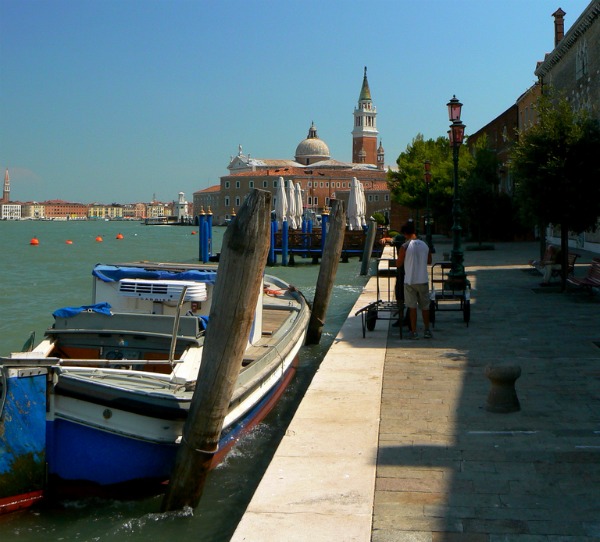This is a guest post by Jessica Spiegel: the wonderful, all-knowing Italy expert behind BootsnAll’s WhyGoItaly.
After taking time out of his busy day to give me a tour of the hostel in Venice he managed, my host offered to give me a mini-walking tour of the neighborhood surrounding the hostel. It was a kind offer, and one I couldn’t refuse, although he’d already gone out of his way to show me every nook and cranny of the old building the hostel occupied.
I followed him up and down the stairs of the former granary, the February chill penetrating the concrete walls and magnifying the fact that the hostel was nearly empty of guests, taking snapshots of rooms and jotting notes in my book. We wound our way in a circular fashion – up the stairs on one side of the huge building and down the stairs on the other – to end up where we’d left off, in the main hall. I thought my visit was complete. It had already taken more time than the other hotel visits I’d done, where managers didn’t have time for grand tours, and I was ready for a nap. Or an espresso break. Or both.
That’s when my host offered his guided walking tour of the neighborhood, and when my inability to be curt or bitchy with people who are being nice to me kicked in. So off we went on a slow-paced walk around the island, pausing occasionally while he gestured toward a building and said… Something.
It’s here that I should mention something critical: my host was speaking not in Italian, but in the Venetian dialect, and to this day I’ve no earthly idea what he was saying for most of the two hours I spent with him. In fact, I’m only guessing that it was a tour of the neighborhood he was offering, since when I got on a vaporetto nearly two hours later that’s what it felt like I’d gotten. But who knows? Maybe when we left the hostel he was asking if I’d like to go get some lunch, or meet his pet parrot, or take a ride in a speedboat. All I know is that like Ginger Rogers, I let someone else lead – and so we walked, slowly, through the deserted streets around the hostel for the next hour and a half, him chattering away and me nodding at regular intervals.
In some ways, it’s my fault. I like to think that I can hold my own in Italian and that, while nowhere near fluent, I can usually get the drift of what’s being said enough to understand even if I can’t quite contribute. I’ve been involved in conversations about travel, food, Italian composers, politics, and religion – and in some of them I even contributed my fair share. The problem is that Italians are a trusting bunch, and once you get past a simple “buongiorno” without stumbling they fawn all over you with “Oh, you speak Italian so well” nonsense and proceed to prattle on in their native tongue, dropped consonants and slang thrown in for good measure.
When I speak to someone whose native language isn’t English, I slow down. I enunciate. I try not to use contractions as much. I skip the heavy slang. I don’t raise my voice, like those stereotypes we all love to hate, but until I’m confident my conversation partner is fluent enough to keep up I try to go easy on the stuff that makes comprehension so hard. But Italians? They don’t have this compassionate gene. Even if you say “Non parlo bene l’italiano,” as long as you’ve said it with a decent accent they’re full steam ahead with the rapid-fire slang-infused Italian.
This brings us to the most confusing element of conversing in Italy – the dialects. Perhaps you’ve been preparing for this trip, studying Italian once a week at the local community college, doing your verb drills, listening to a Pimsleur CD on your commute. In some places, this work will serve you well – you’ll order meals in Italian, get the customary “Oh, you speak Italian so well,” and feel wonderful about it. In other places, you’ll feel like you studied entirely the wrong language – or flew to entirely the wrong country.
Italian dialects are more numerous than you can imagine – they say people who live a few kilometers apart may have different words for the same thing – and in some cases they’re full-blown other languages. Sometimes they sound a bit like Italian, sometimes they sound very much like Italian, and sometimes they sound like Arabic. When I’d been told to meet a guy at that Venice hostel for a tour, I didn’t assume we’d be speaking English, but I did assume – foolishly – that we’d be speaking Italian. Walking through the hostel, I asked questions in Italian and he answered them in Italian, but as soon as the tour was over he slipped back into his dialect, and I was utterly left behind.
I’m moderately comforted by the fact that there are full-blooded Italians who have lived in the country their entire lives who can’t understand the dialects of people in other parts of Italy, but this doesn’t change the fact that I’ll never know what my genial and chatty host was trying to tell me as I followed him around a small island of Venice for hours. It does tell us that while the Italians may not care enough about whether we understand them to slow down or avoid slang, they are a supremely generous bunch. I’ve no idea what my host was saying, but I’ll never forget our walk around Venice.
photo by Nick Bramhall
About the Author: Jessica Spiegel is a Portland-based travel writer for indie travel guide BootsnAll, for whom she writes an online travel guide to Italy. She’s always happy to help travelers find what they need, from cheap flights to hostels to train tickets – and if she doesn’t know the answer, she’ll know who to ask.



